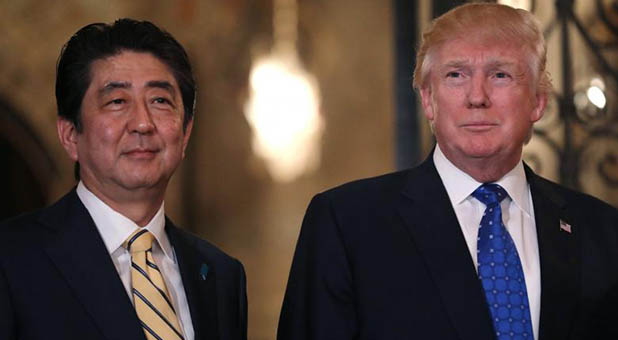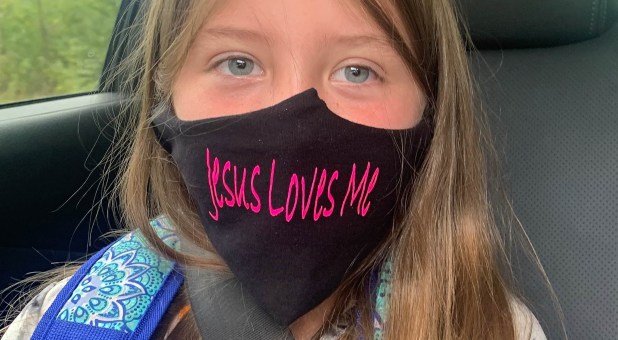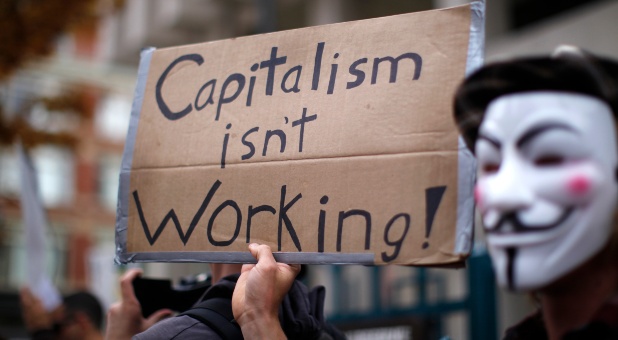By all accounts, President Donald Trump and Japanese Prime Minister Shinzo Abe had a great first meeting over the weekend.
After a brief lunch meeting at the White House, the two traveled to the “winter White House” at the president’s Mar-a-Lago estate, avoiding the traditional presidential retreat, Camp David. According to the press pool reports from the weekend, there was a lot of golfing, high dining, hugs and high fives, prompting some to suggest that there could be a new “special relationship” forging in U.S. foreign policy.
Two of the biggest threats to U.S. national security are China and North Korea, which are shared interests with Japan. While Franklin Roosevelt had Winston Churchill, and Ronald Reagan had Margaret Thatcher, it’s not beyond the realm of possibility that the new dominant pair of world leaders to confront these new threats could be Trump and Abe.
The Japanese prime minister said as much himself during the press conference held at the White House before departing for Florida. In the translation of his speech, provided by the White House afterward, he said:
The cornerstone of peace and prosperity in Asia Pacific, that is the strong Japan-U.S. alliance. And this is unwavering ties between our two countries. I and President Trump will work together to further strengthen our alliance. We have shared this strong resolve.
As we see increasingly difficult security environment, we have confirmed that U.S.-Japan Security Pact Article 5 will be applied to Senkaku Islands. The United States will strengthen its presence in the region. And under the banner of the proactive contribution to peace, Japan will play a greater role. At the same time, we will maintain the deterrence and also to proceed on reducing the impact we had fought through on the realignment of the U.S. forces in Japan.
And Henoko’s—relocation to Henoko of the impasse Futenma is the only solution. And Japan and U.S. will continue to work closely on this.
On North Korea, we would strongly demand North Korea to abandon nuclear and ballistic missile program, and not to make any more provocations. And we have completely agreed on the importance of the early solution for the abduction issue in East China Sea, South China Sea, and Indian Ocean—everywhere we need to maintain the freedom of navigation and rule of law. And such international order there must be maintained.
Japan and United States have confirmed that we will strongly protest any use of force, as well as coercion to change the status quo. I and the President will address not only bilateral but regional issues. And we have had a very frank exchange of views on the peace and prosperity of the world that we should contribute, for any form of terrorism should be strongly condemned. And we will cooperate in our fight against terrorism. Japan will, of course, exercise a commensurate role in this regard. And furthermore, the regional conflict of the refugees, of poverty and infectious diseases— there are many challenges faced by the world, which will be a serious issue to threaten the peace and stability for Japan as well as the United States.
But Japan and the United States and the international community must work hand in hand in order to solve these questions. Of course, there are disagreements, but we should not close down dialogue just by pointing to the differences and ignoring the common interests and common goals. We need to have dialogue because there are disagreements. What we mostly desire—what is most desired by those who are challenging the existing international order is to just focus on differences. We should not close the dialogue of Japan—have for four years that I have consistently followed through on our foreign policy.
The two leaders also discussed trade, particularly in light of Trump’s refusal to participate in the Trans-Pacific Partnership. Japan’s deputy prime minister and Vice President Mike Pence will be involved in ongoing trade discussions, along with the new administration’s new trade and economic team.
But, there were signs of some positive developments in Abe’s White House address:
The United States is a country having the largest number of chances, opportunities in the world. That has always been the case right now, as well as going forward. This will never change. And that is the reason why automotive industries and other Japanese businesses have built factories all over the United States, to engage in local production here. Last year, from Japan to the United States, there have been more than $150 billion of new investment being made into the United States. And those Japanese businesses have created a large number of jobs. The mutually beneficial economic relations have been built by Japan and the United States. With President Trump taking on the leadership, I’m sure there will be—major-scale infrastructure investment will be made, including the fast-speed train.
Those of you who have rode on the Japanese Shinkansen, I’m sure you would appreciate the speed, the comfort and safety with the latest maglev technology. From Washington, D.C. to New York, where Trump Tower exists, only one hour would it take if you ride the maglev train from Washington, D.C. to New York. Japan, with our high level of technical capability, we will be able to contribute to President Trump’s growth strategy. There will be even more new jobs being born in the United States.
And to further deepen these bilateral economic relations between Deputy Prime Minister Aso and Vice President Pence, there will be a cross-sectoral dialogue to be held. And we have agreed on this.
And furthermore, in Asia Pacific, where we see dramatic growth to expand free trade and investment, this will be a big chance for both Japan and the United States. But, of course, it must be done in a fair manner. Never should a state-owned company, backed by state capital, should not make any economic intervention. Free ride on intellectual property should not be condoned. In Asia-Pacific region, with Japan and U.S. taking on the leadership to create free and fair market based upon rules, should be built. I and President Trump have confirmed on our strong will to do so.
Only time will tell if the two leaders are forging an even stronger bond than their predecessors, but it’s certainly off to a good start after last weekend’s visit. {eoa]
See an error in this article?
To contact us or to submit an article





















